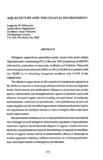Aquaculture and the coastal environment
Share
Abstract
Philippine aquaculture production mostly comes from pond culture (brackishwater) constituting 47% of the total 1987 production of 560,970 t followed by mariculture of seaweeds, mollusks and finfishes. Fishponds have increased from around 61,000 ha in 1941 to 210,400 ha at present while the 130,000 ha of remaining mangroves constitute only 13-26% of the original area.
The effects of aquaculture on the coastal environment are apparent in the decline in nearshore fisheries production and loss of services (typhoon buffer, flood control, soil stabilization). Mangrove conversion into ponds, species introductions and transplantations, spread of parasites, pests and diseases, increased organic nutrient loading, use and release of chemicals, sedimentation, extraction of groundwater, and salinification of soil and water supplies, are the identified aquaculture-related practices that lead to the degradation of nearshore resources. Some ecological effects also have social repercussions.
Recommended measures to solve these problems include: rationalized use of mangroves and mangrove reforestation; regulation of groundwater extraction, import/ use of chemicals, disposal of organic wastes, and introductions/transplantations; research (bacteriology of aquaculture facilities, effects of organic wastes, effects of sedimentation, effects of chemicals on marine organisms including antibiotic resistance, etc.); training and extension; and improvement of interagency coordination.
Suggested Citation
Primavera, J. H. (1991). Aquaculture and the coastal environment. In A. C. Alcala & M. C. Balgos (Eds.), Management of Nearshore Fishery Resources. Proceedings of the Seminar-Workshop on Management of Nearshore Fishery Resources, ECOTECH Center, Cebu City, 23-25 January 1990 (pp. 155-177). Los Baños, Laguna, Philippines: Philippine Council for Aquatic and Marine Research and Development.


